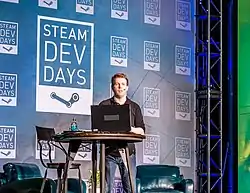Robin Walker (game designer)
Robin Walker (born 1975) is an Australian video game designer best known for co-developing Quake Team Fortress, Team Fortress Classic, Team Fortress 2, and Half-Life: Alyx.
Robin Walker | |
|---|---|
 Walker in 2013 | |
| Born | 1975 or 1976 (age 47–48)[1] |
| Nationality | Australian |
| Alma mater | RMIT |
| Occupation | Video game designer |
Career

Walker attended RMIT University in Melbourne, Australia.
Together with John Cook and Ian Caughley, Walker started working on Team Fortress as a mod for id Software's QuakeWorld in 1996. Due to the popularity of the product, the team was hired by the then-small Valve to work on Team Fortress Classic and later on Team Fortress 2.[2][3]
Walker has played development roles in various Valve games, including Half-Life 2 and Dota 2.[4][5] More recently, Walker has been focused on the collision of economics and game design, in an attempt to transform Team Fortress 2 into a free-to-play, microtransaction-based game.[6] Walker worked on Valve's flagship virtual reality game, Half-Life: Alyx, released on March 23, 2020.[7]
Influences and philosophy
Walker used Team Fortress 2 updates to research what additional features are and aren't popular. The results of which he has used for the development of Dota 2,[5] as well as for later Team Fortress 2 updates. Walker also stated that he cannot guarantee that he would keep working on Team Fortress 2 indefinitely and that at some point, he will move on to a new project.[8]
Walker believes in the importance of communication between players and developers of modern PC games, stating that "being close to your customers – being able to talk directly to your customers – is valuable." In his experience, successful multiplayer games "innovate in gameplay both on release, but also over time post-release, and that those innovations are significant and of interest to customers."[9]
Walker is notably not worried about video game piracy, stating that to fight piracy, he is "looking at the things that pirates are providing and asking [himself] how [he] can provide something better than that." By releasing frequent updates of his games after launch, he constantly improves on his games in a way that pirates could not keep up with.[9][10] Walker is a supporter of the free-to-play model, as he says that the model supports a wider variety of customers, including those with "very little money," and that such a variety of players results in greater opportunities for richer experiences.[11][12]
Selected credits
| Year | Game title |
|---|---|
| 1996 | Team Fortress (Quake modification) |
| 1998 | Half-Life |
| 1999 | Team Fortress Classic |
| 2000 | Counter-Strike |
| 2000 | Gunman Chronicles |
| 2004 | Half-Life 2 |
| 2005 | Half-Life 2: Lost Coast |
| 2006 | Half-Life 2: Episode One |
| 2007 | Half-Life 2: Episode Two |
| 2007 | Portal |
| 2007 | Team Fortress 2 |
| 2008 | Left 4 Dead |
| 2013 | Dota 2 |
| 2020 | Half-Life: Alyx |
References
- Dodson, Joe (13 October 2007). "By Design – Half-Life 2: Orange Box". GameSpot. Retrieved 16 December 2014.
- Steinkuehler, Constance; Squire, Kurt; Barab, Sasha (11 June 2012). Games, Learning, and Society: Learning and Meaning in the Digital Age. Cambridge University Press. p. 70. ISBN 978-0521196239. Retrieved 8 December 2014.
- Dafnis, Jason (31 October 2014). "Ten Games That Came Back From (Development) Hell". Game Informer. Retrieved 8 December 2014.
- Wyman, Michael Thornton (12 November 2012). "Half-Life 2". Making Great Games: An Insider's Guide to Designing and Developing the World's Greatest Games. Taylor & Francis. ISBN 978-1136132377. Retrieved 8 December 2014.
- Peel, Jeremy (15 January 2013). "Some Team Fortress 2 updates "largely about gathering data" for Dota 2". PCGamesN. Retrieved 8 December 2014.
- "Putting the Community in Charge; From control to collaboration – how and why to let your customers build your products". Reflections|Projections. 12 October 2013. Retrieved 8 December 2014.
- Kim, Matt (21 November 2019). "Half-Life: Alyx Is 'About the Same Length as Half-Life 2'". IGN. Retrieved 21 November 2019.
- Sonntag, Lawrence (20 August 2010). "Valve's Robin Walker talks Team Fortress 2". Indie Gaming Daily. Retrieved 8 December 2014.
- Remo, Chris (5 June 2008). "In-Depth: Valve On Team Fortress 2 – Devs As Service Providers". Gamasutra. Retrieved 8 December 2014.
- "How to Beat Pirates Transcript". OnTheMedia. 8 April 2011. Retrieved 8 December 2014.
- Crossley, Rob (24 June 2011). "Valve explains to Develop why it relaunched Team Fortress 2 as free-to-play forever". MCV. Develop. Retrieved 8 December 2014.
- Luton, Will (12 November 2012). "Economics how the money works". Free-to-Play: Making Money From Games You Give Away. New Riders. ISBN 978-0133411249. Retrieved 8 December 2014.